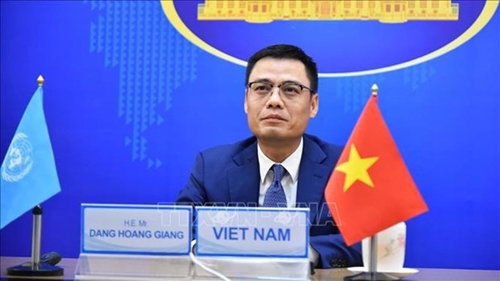In his remarks, Ambassador Dang Hoang Giang, Permanent Representative of Vietnam to the U.N., held that the countries need to have a comprehensive approach to counter-terrorism at the national, regional, and global levels, with the U.N. playing the coordinating role, in line with international law and the U.N. Charter.
They should continue to effectively deal with structural challenges like inequality and political, economic and social injustice, he said, noting that as countries are striving to recover after the COVID-19 pandemic and facing numerous socio-economic difficulties, the international community’s assistance for the struggling countries are of great importance.
    |
 |
|
Ambassador Dang Hoang Giang, Permanent Representative of Vietnam to the U.N. |
He called on countries to perform their obligations in accordance with international law while preventing the conducting, incitement, or sponsorship of terrorist acts against others.
The diplomat added Vietnam has made efforts to implement the U.N. Global Counter-Terrorism Strategy and international obligations in the terror fight, stressing it has also cooperated closely with international organizations and other countries in this regard.
Vietnam has joined 15 global conventions and many regional and bilateral agreements on the fight against terrorism and trans-national crimes. In particular, it has attached importance to national obligations under the U.N. Security Council resolutions on the fight, included regulations on the issue in many relevant legal documents, and continuously improved law enforcement bodies’ capacity, including by setting up a counter-terrorism training center under the Ministry of Public Security in February 2022.
At the meeting, participants expressed their concern that the terrorism situation remains complex in the world, directly affecting international peace and security and threatening the stability and sovereignty of many states. They condemned terrorism and called on the international community to improve their sense of responsibility and perform international obligations on counter-terrorism.
Many countries stressed the need to ensure the principle of respecting national sovereignty while activities against international terrorism are conducted, and others highlighted their opposition against financing or supporting terrorists.
Members of the Non-Aligned Movement (NAM) and many other states shared the view that countries need to act in line with international law and not support, encourage or allow terrorist organizations to operate in their territories. They also stressed the necessity to enhance international cooperation in counter-terrorism, and voiced support for the U.N.’s central role in this regard.
Source: VNA